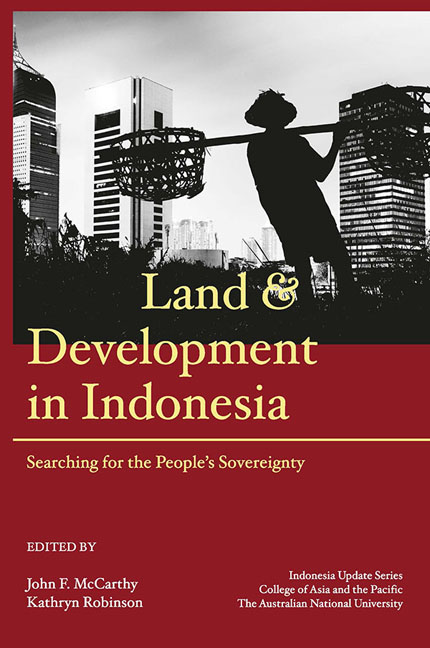Book contents
- Frontmatter
- Contents
- Tables
- Figures
- Contributors
- Acknowledgements
- Glossary
- Map
- 1 Land, economic development, social justice and environmental management in Indonesia: the search for the people's sovereignty
- PART 1 LAND USE AND LAND LAW: THE BIG PICTURE
- 2 The plantation and the mine: agrarian transformation and the remaking of land and smallholders in Indonesia
- 3 Indonesian land law: integration at last? And for whom?
- PART 2 ENVIRONMENTAL AND CUSTOMARY FRAMING OF LAND TENURE
- PART 3 URBAN AND INFRASTRUCTURE DEVELOPMENT
- PART 4 AGRICULTURE, LAND TENURE AND LIVELIHOODS
- PART 5 LARGE-SCALE LAND ACQUISITIONS AND SMALLHOLDER DEVELOPMENT
- Index
- Miscellaneous Endmatter
2 - The plantation and the mine: agrarian transformation and the remaking of land and smallholders in Indonesia
from PART 1 - LAND USE AND LAND LAW: THE BIG PICTURE
Published online by Cambridge University Press: 29 July 2017
- Frontmatter
- Contents
- Tables
- Figures
- Contributors
- Acknowledgements
- Glossary
- Map
- 1 Land, economic development, social justice and environmental management in Indonesia: the search for the people's sovereignty
- PART 1 LAND USE AND LAND LAW: THE BIG PICTURE
- 2 The plantation and the mine: agrarian transformation and the remaking of land and smallholders in Indonesia
- 3 Indonesian land law: integration at last? And for whom?
- PART 2 ENVIRONMENTAL AND CUSTOMARY FRAMING OF LAND TENURE
- PART 3 URBAN AND INFRASTRUCTURE DEVELOPMENT
- PART 4 AGRICULTURE, LAND TENURE AND LIVELIHOODS
- PART 5 LARGE-SCALE LAND ACQUISITIONS AND SMALLHOLDER DEVELOPMENT
- Index
- Miscellaneous Endmatter
Summary
Across Indonesia, radical changes are taking place in how land is being used, claimed and controlled. The conversions from forests and farms to plantations and mines are particularly significant. West Kalimantan (in Indonesian Borneo) is both representative of these changes and unique. It was once a forested landscape (Brookfield, Potter and Byron 1995), but as of 2014, some 91 per cent of the province's land had been formally allocated for present or future industrial uses (Pilin 2014). Thirty-six per cent of the province's land is held by oil palm companies, 37 per cent is allocated to industrial mining and 27 per cent is maintained by the Ministry of Forestry for industrial forest concessions, protected forests and nature reserves (Pilin 2014). Hundreds of small mining sites dot West Kalimantan's industrialised landscapes, their territorial reach uncounted.
Indonesia's sustained part in the global palm oil boom and the country's industrial and small-scale mining rushes have made headlines and filled scholarly volumes the world over (Yuan 2000; Erman 2007; McCarthy, Gillespie and Zen 2012; Maimunah 2014; Potter 2015; Rigg 2015). In their wake, smallholder farmers have lost control of territory (Rachman 1999; McCarthy, Gillespie and Zen 2012; Lucas and Warren 2013; Potter 2015). Yet, the meta-narratives associated with land rushes and grabs, or with the ‘illegalities’ of small- and large-scale mining, do not fully explain what is happening on the ground (Lahiri-Dutt 2004; Borras and Franco 2013). I argue here that how land losses have been precipitated at different times, what generated them and how small farmers have responded have, at least in one corner of West Kalimantan, been heavily determined by local history. Some of the monopolising effects of large-scale land acquisitions may never be felt. Nevertheless, the converging trajectories of dynamic local practices, claims and histories have not been adequately accounted for in analyses dependent on formal, state-recognised categories of land and land ownership (Lucas and Warren 2003, 2013; McCarthy 2013).
Critically, it is not land scarcity—the usual explanation for farmers being motivated to seek off-farm income—but the low value of the commodities farmers produce that has driven many northwestern Kalimantan smallholders to participate in mining or to turn over their land to corporate oil palm companies. I use the term ‘smallholders’ here to refer to semi-autonomous, rural producers of agricultural, agroforestry or mineral resources who control less than 15 hectares of rural agrarian land (specifically in Kalimantan).
- Type
- Chapter
- Information
- Land and Development in IndonesiaSearching for the People's Sovereignty, pp. 35 - 62Publisher: ISEAS–Yusof Ishak InstitutePrint publication year: 2016



